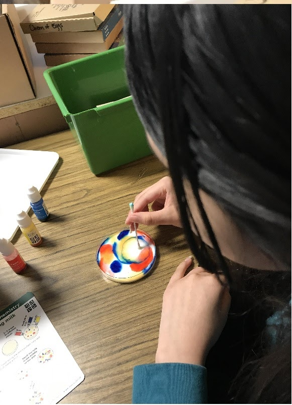Looking for a greenhouse
One of the things than you face in smaller companies is that you have to do everything on your own. Small problems that were magically solved in an instant in a large company – travel arrangements, office supplies, computers, contracts and such – become a major pain in the neck here. I want to find a company that I can “outsource” all of my secondary activities to. And if there is none out there, I’ll create it.
Most of my work at SPB Software focused on creating perfect conditions for others. Developers had to write code and not think about anything else. If they needed phones for testing, the phones were there the next day. If they needed an English-language UI translated into a bunch of languages, I would find the right people. If a PC went out of order, I’d take care of it as well. Basically, the entire company was divided into two parts: production units working on the company’s products and horizontal structures that acted as levers that helped a small team achieve better results. A developer could simply add a string to the localization system to find it translated very shortly. However, the real work – finding translators, creating tasks for them, checking on their progress, rushing then in case of delays, testing, making sure the translations integrated well into interfaces, – all of this remained hidden from them. A kind of encapsulation in the best sense of the word that helps completely focus on the product.
After that, I joined Yandex. All of these processes existed there as well, yet on a much, much greater scale that made you feel absolutely relaxed. Everyday issues get sorted out for you. They have entire departments assisting the production units: a legal department that deals with any contract-related question; a helpdesk that will fix your computer, connect to a local network or do anything else related to corporate hardware or software; admins that will keep services up and running; a patent department; an outsourcing department that will help find a reliable vendor, write a specification and complete a projectа, and so forth. Product teams work in greenhouse conditions. The head must concentrate on the product, not on secondary tasks that are important, but never convert into unique selling points of a product.
Now I have my own small company and I am facing the same organizational and administrative problems. Over the past month, I spent 30% of my time, tops, on the product. The rest was wasted on solving the problems that are silently taken care of in large companies. No greenhouse conditions whatsoever. The two things that keep me afloat are YouDo and my multi-year experience. You know which companies to contact when you need a developer, need a patent application submitted, need your books done and stuff like that. However, working with a dozen providers coupled with tons of small administrative tasks is a large distraction from the main course. And it’s just me know, but the company will soon have a designed, a chemist and a developer, and I want to give that the best greenhouse conditions there are, so that they can concentrate on our product only. I don’t want them to think about a way to buy the necessary reagent instead of contemplating over calculating and visualizing the mechanism of this reaction.
So the bottom line is that I need a greenhouse. I will either find it or will have to create it. Here’s what I need from it:
- Organizational tasks:
- configuring, purchasing and fixing computers
- general procurement
- office rent, negotiations with business centers, office maintenance
- business tips: tickets, hotel reservations, etc.
- catering
- insurance for employees
- logistics and transportation services
- purchasing stationary, cleaning the office
- occasional printing of business cards, flyers, booklets and other materials
- organization of meetings and other typical secretary’s activities
- Legal, accounting and related issues:
- registering a company and obtaining the necessary permits and certificates
- bookkeeping
- personnel record keeping
- legal documents: work contracts, copyright registration, etc.
- Parts of the main business that do not create a competitive advantage:
- creation of the work infrastructure: email, bug tracking, wiki, etc.
- localization of texts and interfaces
- site design, development and maintenance
- creation of a large number of texts
- text editing
- headhunting, initial interviews
- Help employees get rid of everyday problems:
- visit institutions
- take cars to MOT tests, car washes
- pay fines
- reserve a place in the queues at institutions that require personal attendance
It is also very important to have a “one window” system that will efficiently solve these problems. Not 10 different people and companies, but a single company with a single dedicated person working for you (two, actually – I will go over it later). Most of these activities will definitely be outsourced to specialized companies, but it’s important to have one primary contractor responsible for everything.
It would be awesome to have a proper greenhouse with outstanding conditions. So that when I needed a phone, a chair or a chemical reagent, I would simply fill out a form and see it all in my office the next day. So that we would never run out of paper, pens and printer cartridges and would never have to remind anyone about it. So that backup jobs would be configured on all workstations, and a lost laptop would be replaced in two hours (the helpdesk would have to know where to quickly buy a replacement for any system used in the company and restore it from a backup copy).
Where should I be looking for such a company?
Do you know such a company? I’d hire it. And if it doesn’t exist, we’ll have to create it. I am not ready to be an active contributor, but ready to be an investor and the first client of whoever can do that.
Please contact me if you have any information or plans to create such a service
Why a separate company?
Most companies face these companies. Most companies solve them by creating corresponding departments. These departments always become “bystanders”. In a company of developers speaking the same geek lingo, law experts and accountants feel slightly uncomfortable. I have some serious considerations as to why these activities should be outsources to a separate company:
A. A close-knit team. It’s always better if a team has no “zero value” people, if they are all made of the same dough. Imaging a company working on a mobile social network. Everyone there – from a developer to a marketing expert – is obsessed with this idea. During lunch, they discuss the features of a new Chinese social network. When they go to a picnic, the find fresh ideas in everything they do and come up with new ways of making their social network better. An accountant just doesn’t fit into this picture. Whenever he or she is with the rest of the team, they feel they are outcasts and make the team feel the same.
B. Professional pride. It’s hard to become a first-class accountant if you are the only one in your company making navigation software, where navigational features take the first, second and third places in the hierarchy of values. However, you need accountants just as you need light bulbs in a dark corridor. In a product company, administrative personnel will always be secondary. Whereas in a company whose sole existence is focused on making other companies happy, their role is completely different. In a greenhouse, such personnel are as precious as gems.
C. Concentration. Such a department helps the top management focus on the product and not on creating the company’s infrastructure. After all, good infrastructure is not a competitive advantage of your product. Your game won’t get more players if you have a cozy bathroom at your office, although it’s kind of hard to make a game without it. Good infrastructure is important, but it’s not enough for the success of your product. They most important people in the company should be focused on the most important things.
D. Competition. I believe that competition on the market of service providers makes them move forward all the time. An internal department does not compete with anybody and has fewer incentives to get better.
Risks
There are risks in such an approach to outsourcing non business-critical processes. If you go this way, such a greenhouse will know a LOT about you and you will depend on it big time. Some of these risks are still there even if you own these departments. Except for one risk, I guess: the risk of such a greenhouse “closing the office and going away”. The following can be done to minimize them:
1. Absolute confidentiality. Confidentiality in such a greenhouse must be their cardinal mantra, a rule imposed with paranoid vigor. This is a solvable problem – after all, we entrust our deepest secrets to doctors and lawyers.
2. Competition between greenhouses. There should be several greenhouses on the market, which will create competition and allow outsourcing a minor part of activities to alternative vendors to decrease dependence from the main one. Similar to what we do by purchasing a backup Internet connection in addition to the main one. Greenhouses must provide maximum transparency for their activities and disclose their subcontractors, so that we can move a particular activity in-house as quickly as possible, when necessary.
3. Managers working in pairs. There must be two managers, not just one, working on the side of the greenhouse. Like cops who always have a partner. A pair of managers working for two companies is the most reliable model. Such a model will still work if one of the managers takes a vacation or decides to leave the company.
4. A greenhouse must have transparent pricing. I am ready to pay 20% extra if they take 50% of my headache away and if I know that this is the only extra I will need to pay. Moreover, thanks to increased efficiency and amount of work, I may end up paying less that I would be paying if were organizing all this on my own. But I’ve got to be sure that I am paying 20% extra, not 200%.
See also

CASE STUDY - 8th Grade students at St Timothy's Catholic School use MEL Chemistry to enhance their science lessons
Saint Timothy Catholic School in Mesa is committed to promoting academic excellence in each child it looks after. They encourage self-discipline, self-respect, and respect for others. They understand the importance of engaging students in a comprehensive and relevant curriculum. As a result, the middle school science teacher from St. Timothy Catholic School is using MEL Chemistry subscriptions to enhance and expand their range of learning activities.

CASE STUDY - MEL Chemistry allowing pupils to reach their full potential
The Empower Learning Center is the Alternative Learning Program (ALP) within the Hinckley-Finlayson School District. They offer non-traditional education options for students ages 16-21 in their daytime program, night school for traditional high school students who need to make up credits, and night school for adults 18 and older who would like to complete their diploma or equivalency.
The school was seeking engaging, hands-on chemistry kits to make their science classes more interactive, and to help their students understand key science concepts and achieve their full potential in chemistry.

CASE STUDY - MEL Chemistry at Lund International School, Sweden
Emma Taylor, a science teacher at Lund International School (Sweden), has chosen MEL Chemistry sets as the best option for her students’ science classes. In Lund International School, all programmes are taught in English, and having chemistry sets in English are a great asset to accompany science classes.
Here, Emma shares her experience of how MEL Chemistry sets improved her students’ comprehension and understanding of science concepts.

